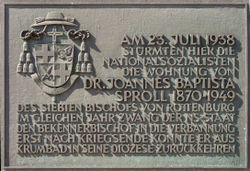
Johannes Baptista Sproll
Encyclopedia

Germany
Germany , officially the Federal Republic of Germany , is a federal parliamentary republic in Europe. The country consists of 16 states while the capital and largest city is Berlin. Germany covers an area of 357,021 km2 and has a largely temperate seasonal climate...
Bishop and prominent opponent of the Nazi regime.
Sproll was born in Schweinhausen, near Biberach
Biberach
Biberach is the name of several locations in Germany.* Biberach an der Riss, a town in Upper Swabia* Biberach , which has Biberach an der Riss as its capital* Biberach, Baden, a municipality in the Ortenaukreis...
, the son of a street mender, Josef Sproll, and his wife, Anna Maria née Freuer. He attended the Latin school in Biberach and the Gymnasium Ehingen. He studied Catholic
Catholic
The word catholic comes from the Greek phrase , meaning "on the whole," "according to the whole" or "in general", and is a combination of the Greek words meaning "about" and meaning "whole"...
theology
Theology
Theology is the systematic and rational study of religion and its influences and of the nature of religious truths, or the learned profession acquired by completing specialized training in religious studies, usually at a university or school of divinity or seminary.-Definition:Augustine of Hippo...
at the University of Tübingen from 1890 to 1894. In 1898, he received his Ph. D. for his work on the history of the law and constitution of the Tübingen
Tübingen
Tübingen is a traditional university town in central Baden-Württemberg, Germany. It is situated south of the state capital, Stuttgart, on a ridge between the Neckar and Ammer rivers.-Geography:...
monastery of St. George. On June 14, 1927, he became the Bishop of Rottenburg.
During the Nazi
Nazism
Nazism, the common short form name of National Socialism was the ideology and practice of the Nazi Party and of Nazi Germany...
era, Sproll often spoke out against the regime, and his abstention from the plebiscite over the Anschluss
Anschluss
The Anschluss , also known as the ', was the occupation and annexation of Austria into Nazi Germany in 1938....
led to preliminary proceedings and staged demonstrations against him. At the end of August, 1938, Sproll was expelled from his diocese and could not return again until 1945. On August 1, 1940, Conrad Gröber
Conrad Gröber
Conrad Gröber was a Catholic priest and archbishop of the Archdiocese of Freiburg.-Youth and education:...
, Archbishop of Freiburg, and the Vicar General
Vicar general
A vicar general is the principal deputy of the bishop of a diocese for the exercise of administrative authority. As vicar of the bishop, the vicar general exercises the bishop's ordinary executive power over the entire diocese and, thus, is the highest official in a diocese or other particular...
of the Diocese of Rottenburg (acting for Sproll) protested against the euthanasia
Euthanasia
Euthanasia refers to the practice of intentionally ending a life in order to relieve pain and suffering....
programmes in Grafeneck
Grafeneck
Grafeneck is a small rural village in Germany, near the town of Münsingen, south-west of Stuttgart. Grafeneck Castle, which had previously been an asylum for crippled people, was turned by the Nazis into an extermination facility....
; this was also the year of the protest of the Bishop of Münster, Clemens August Graf von Galen
Clemens August Graf von Galen
Blessed Clemens August Graf von Galen was a German count, Bishop of Münster, and Cardinal of the Roman Catholic Church....
. Sproll died in 1949 in Rottenburg am Neckar
Rottenburg am Neckar
Rottenburg am Neckar is a medium-sized town in the administrative district of Tübingen in Baden-Württemberg, Germany. It rests about 50 km southwest of the provincial capital Stuttgart and about 12 km southwest of the district town Tübingen...
.

